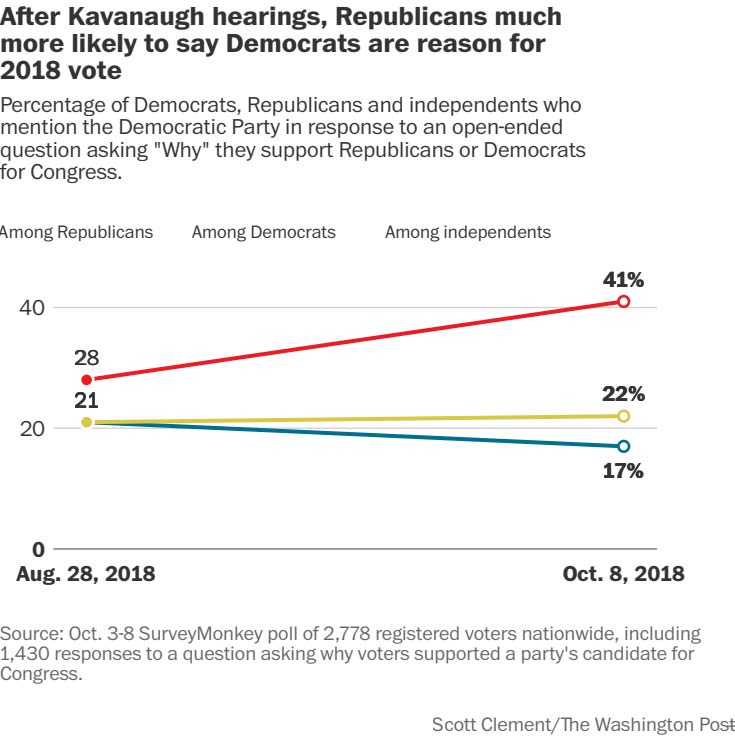
"It's been a great political gift for us," McConnell said.
A new survey bears out some of the glee McConnell exhibited in his victory lap: The numbers suggest that the debate may have led Republicans to increasingly focus on their dislike of Democrats when thinking about voting in November.
The SurveyMonkey poll finds 41 percent of Republicans mentioned "Democrats" or the Democratic Party when explaining the reason for their congressional vote, more than any other single word and up 15 percentage points from August, when 28 percent said the same.
The poll was unique in asking registered voters which party they support for Congress, followed by an open-ended question: "Why?" The survey obtained 1,430 specific open-ended responses from voters of all political backgrounds from Oct. 3-8, a period that overlapped Kavanaugh's confirmation on Oct. 6. The text-based reasons for voting were analyzed by a team of researchers at the University of Michigan and Georgetown University that identified the most common words voters used to explain their support.
Republicans' increasing focus on Democrats in their congressional vote was not paralleled by an increase in Democrats' focus on Republicans - 36 percent mentioned the GOP in explaining their vote in the most recent data, compared with 34 percent in August. Democrats were also no more likely to name President Donald Trump at the end of the Kavanaugh nomination process than in late August (15 percent vs. 18 percent).
Also notable is how the increase in voters mentioning Democrats as a reason for their vote was limited to Republicans. The share of independents who mentioned Democrats when asked why they are supporting a party for Congress was 21 percent in August and 22 percent in the new survey, while the share of Democrats mentioning their own party declined slightly (from 21 percent to 17 percent).
Republicans' verbatim responses show none used McConnell's "mob" to describe how Democrats factored into their vote, but the sentiment from many focused on similar criticisms of Democrats during the Kavanaugh hearings and beyond.
A Republican voter from Minnesota wrote: "Democrats or progressives have made a mockery of the Supreme Court nomination process." A Texas Republican wrote, "Democrats are obstructionists," while another from Tennessee said, "I oppose the democrats way of dirty politics." Along similar lines, a Republican in Florida said, "Dems have become bullies and liars."
Another set of Republicans mentioned more ideological criticisms of Democrats that were prevalent in the August SurveyMonkey poll, including a Colorado Republican who explained his vote, "because the democrats are no better than communists." A Republican from Indiana wrote the reason for his congressional vote is that the "Democratic Party is too far left," while another Republican from Oregon wrote, "Democrats are about destroying America with Socialism. "
Some Republicans described general criticisms of Democrats as being extreme or dangerous, saying the party is "ruining this wonderful country," that "Democrats are anti-American" or that "Democrats are destroying liberty." A Virginia Republican said: "Democrats are deranged. Offer no ideas. Only hate."
This broad range of Republican voter rationales suggests that the Kavanaugh debate may have reinforced a range of negative views toward Democrats being obstructionist, extreme or un-American rather than specific concerns about handling the Supreme Court nomination process. In fact, very few respondents of any partisan background mentioned Kavanaugh, the Supreme Court or other related terms in explaining their vote.
Another interesting dynamic that persisted from August and October surveys was that when asked to explain their vote preference for Congress, partisans are much more likely to mention the opposite political party than the one they identify with. Among self-identified Republicans, nearly three times as many mentioned the Democratic Party as mentioned Republicans, 41 percent vs. 14 percent. Democrats were a mirror image, with 36 percent evoking the Republican Party to explain their vote while 17 percent mentioned their own party.
Along the same lines, the August wave of data found that voters who support Democrats were twice as likely to mention Trump in explaining their support for Congress as those who support Republicans. That dynamic has hardly changed, with 19 percent of voters who support Democrats mentioning Trump along with 9 percent of those who back Republicans who also mention Trump.
The SurveyMonkey poll was based on interviews with 2,778 registered voters nationwide Aug. 22-28, and included 1,430 responses to the question asking why voters supported a party's candidate for Congress. The poll was conducted by among a sample of the millions of people who take an unrelated user-generated survey on SurveyMonkey's platform, a non-probability sampling method of all U.S. registered voters. Analysis of open-ended survey responses used unweighted data. See here for more on SurveyMonkey's methodology.
The poll and analysis above are part of a collaboration between SurveyMonkey, The Washington Post and researchers at the University of Michigan and Georgetown University. Data collection and analysis were managed by Mark Blumenthal and Sarah Cho of SurveyMonkey, with design and analysis by Josh Pasek, Stuart Soroka and Michael Traugott from the University of Michigan and Jonathan Ladd of Georgetown.
Question wording:
If the election for the U.S. House of Representatives were held today, would you vote . . . ? Options: Definitely for the Democrat, Probably for the Democrat, Leaning Democrat, Leaning Republican, Probably for the Republican, Definitely for the Republican, Would not vote.
Why? (Open-ended)


 Contact The Editor
Contact The Editor
 Articles By This Author
Articles By This Author